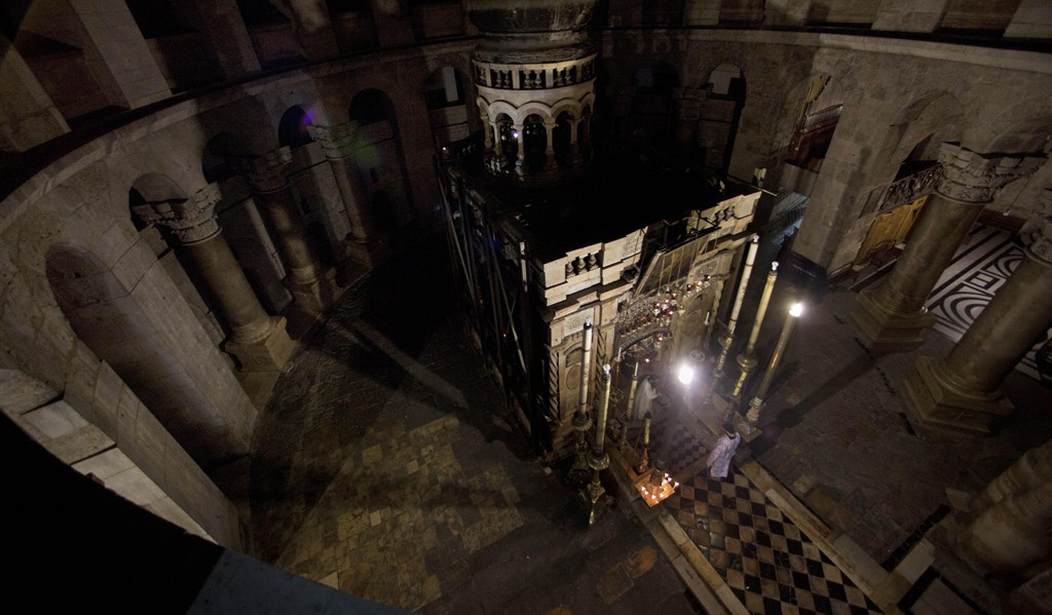Over 40 days ago, Ash Wednesday began with the words, “Remember Man thou art dust and unto dust thou shalt return.” After having lived this period of prayer penance and almsgiving and having passed through Good Friday, we arrive today at the great silence of Holy Saturday.
It is the day the Creed is summed up in the words “he descended into Hell.” It is not the hell of the damned, which would certainly surprise Satan. It is Old English for the abode of the just, those waiting for the gates of Heaven to be opened.
Holy Saturday is the day of the fulfillment of Hope. It is the day Adam and Eve and all their descendants who lived just lives can enter paradise.
Holy Saturday is the day of great silence in between the taunts hurled at Jesus on the cross by his enemies on Good Friday and the gentle words Jesus spoke to Mary Magdalene, that great apostle to the apostles, in the garden on Easter morning.
Today is a reminder that ours is a hidden God, one who hides in the silence of the tomb. If during Lent we meditate on the four last things, Death, Judgment, Hell, and Heaven, we are left now with the silent realization that the God who is beyond the stars is within us. He is closer to us than we are to ourselves. Only in recognizing him in that silent presence can we ever know who we are and who He is.
And what are we? Children of God. The Trinity had each soul in mind and fitted it with the gifts and talents needed to fulfill its destiny before the creation of the universe. No one is an afterthought. We may not know God, but He knows us.
We live in a culture full of noise designed to anesthetize the soul from realizing it is a child of God. We live in a sea of sound designed to drown out the inklings of guilt that envelop today’s general apostasy and, in some cases, outright atheism.
God’s response is not more noise but the silence of Holy Saturday. As anyone who has attended a wake knows, words are inadequate in the face of death.
Only the presence of God, found in hope and trust, brings that peace that passeth understanding. Divine filiation, the knowledge that we are sons of God, provides a safe harbor as we approach the hidden God. He is the God who shared our existence by entering not only into death at the hand of his foes but the silence of the tomb.
Such is the God St. Augustine said was “more inward than the most inward place of my heart and loftier than the highest.”
In his book "The Power Of Silence," Robert Cardinal Sarah of Guinea, West Africa, writes, “...silence is of capital importance because it enables the Church to walk in the footsteps of Jesus, imitating his 30 silent years in Nazareth, his 40 days and 40 nights of fasting and intimate dialogue with the father in the solitude and silence of the desert. Like Jesus confronted with the demands of his Father’s will, the Church must seek silence in order to enter ever more deeply into the mystery of Christ. The Church must be a reflection of the light that pours out from Christ. And the light of Christ gleams, radiates, and illumines in silence and cannot be stopped by the deafening night of sin which prompts St. John to say: “The light shines in darkness and the darkness has not overcome it” (Jn 1:5) Light makes no noise. If we want to approach this luminous source, we must assume an attitude of contemplation and silence.
St. Augustine, the most modern of hedonist converts, may have best summed up the need to find Jesus hidden within with silence of the soul: “Late have I loved thee, O Beauty ever ancient and ever new; late have I love thee! For behold thou wert within me, and I outside; and I sought thee outside and in my unloveliness fell upon those things that thou hast made. Thou wert within me, and I was not with thee. I was kept from thee by these things, yet had they not been in thee they would not have been at all.”
The silence of Holy Saturday is a call to look within. Its silence might be confusing to a world desperate to explain and prove everything. Is it then a time to watch the clock between Good Friday and the Resurrection of Jesus on Easter Sunday? Is it an absence or a fruitful silence? Or is it both?
While God is always reasonable, all questions cannot be answered with words or arguments. As St. Augustine said, our call is to be humble before the unfathomable majesty of God. “If you understood him,” Augustine said, "He would not be God.”










Join the conversation as a VIP Member